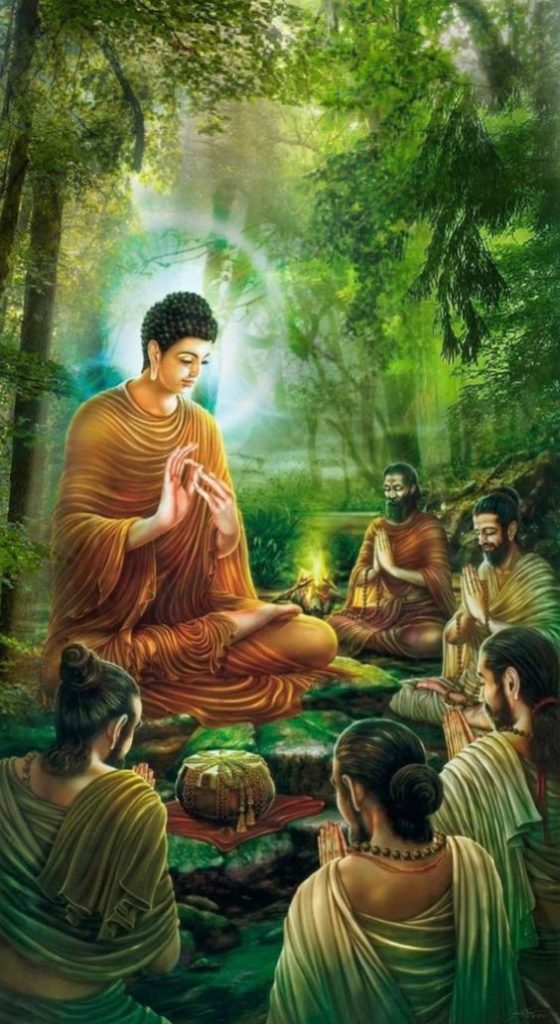Who Is The True Author Of Salvation? (Five)

Gautama Buddha and his adherents
(…continues from part four…)
5) Gautama Buddha: In Buddhism, the idea of salvation is that the elimination of desire leads to eternal bliss. The final state is unconsciousness as one is absorbed into the greater Being. This is accomplished through meditation, religious practice or asceticism. The goal is to discipline the body to the point where it no longer experiences desire since it is desire that is the root of all pain and suffering.*Liberation, called nirvāna in Buddhism, is seen as an end to suffering, rebirth, and ignorance. The Four Noble Truths outline some of Buddhist soteriology: they describe suffering (dukkha) and its causes, the possibility of its cessation, and the way to its cessation, that is, the Noble Eightfold Path, which includes wisdom (pañña), morality (sīla), and concentration (samādhi). The means of achieving liberation are further developed in other Buddhist teachings. (Azam Khodashenas pelko)
Asceticism, as a religious practice is, self-salvationism. It means one can personally save oneself. Now, let us understand the teaching of the Bible. Romans 3:23-26 “For all have sinned, and come short of the glory of God; 24) Being justified freely by his grace through the redemption that is in Christ Jesus: 25) Whom God hath set forth to be a propitiation through faith in his blood, to declare his righteousness for the remission of sins that are past, through the forbearance of God; 26) To declare, I say, at this time his righteousness: that he might be just, and the justifier of him which believeth in Jesus.” The Greek word for ‘sinned’, hamartano (ha-mar-ta’-nō) is: ‘1. (specifically) to morally fail (through action or inaction, through contemplation or deed). 2. (specifically) to be morally disqualified.’ This hamartano speaks of ‘missing the mark – of righteousness.’ Mankind is too fraught with sinfulness to appear before God unaided spiritually.

“For in him we live, and move, and have our being” (Acts 17:28)
Without Jesus, the Second Member of the Godhead, there is no justification at all before the thrice holy God, the Almighty. Pauline Holy Spirit – the Third Member of the Godhead – inspired teaching continues in the next verse with: “Where is boasting then? It is excluded. By what law? of works? Nay: but by the law of faith” (Romans 3:27). Religious self-afflictive ritualism of asceticism tends to puff up egoism, making one to believe that one is capable of doing something about Adamic fall. What saves an Adamic fallen creature is the finished work of the cross. “Where,” as Paul asks, “is boasting?” The law of absolute faith in Jesus Christ, the Lord of glory, renders it faux pas. Amen!
Teachings of Buddha: The basic tenants of the Buddhist faith are called the Four Noble Truths and the Eightfold Path. The Four Noble Truths are meant to uncover one’s eyes of the dust from the secular world and show the practitioner that:
1. Life is suffering: it is suffering because we are not perfect nor is the world in which we live perfect.
2. The origin of suffering is attachment or desire: attachment
3. The cessation of suffering can be attained through the detachment of desire and craving.
4. The end of suffering is achieved by seeking the middle path. It is the middle way between the two extremes of excessive self-indulgence and excessive self-mortification, leading to the end of the cycle of rebirth.
The middle path can be achieved by following the Eightfold Path to end suffering and begin the course of reaching nirvana. The Eightfold Path requires the practitioner to seek:
1. Right or Perfect View: is the beginning and the end of the path, it simply means to see and to understand things as they really are and to realize the Four Noble Truths.
2. Right Intention: can be described as a commitment to ethical and mental self-improvement.
3. Right Speech: is abstaining from the use of false, slanderous, and harmful words which hurt others.
4. Right Action: means to abstain from harming others, abstain from taking what is not given to you, and avoid sexual misconduct.
5. Right livelihood: means that one should earn one’s living in a righteous way and that wealth should be gained legally and peacefully.
6. Right Effort: is the prerequisite for the other principles of the path as one needs the will to act or else nothing will be achieved.
7. Right Mindfulness: the ability to contemplate actively one’s mind, body, and soul.
8. Right Concentration: the ability to focus on the right thoughts and actions through meditation. (From Khan Academy: By Dr. Melody Rod-ari).

According to Buddhism teachings, what is stopping attainment of happiness are unconscious attachments to a lesser self. The Nine Consciousness levels firstly consists of the five senses (touch, taste, sight, hearing, smell.[3]) One is aware of these five consciousness levels from the moment they are born, taking in information about the outside world.[3]
The sixth consciousness is when one learns to understand what is being taken in from the five senses. This is the level that integrates all the sensory input gathered by the first five levels.[6] It achieves this by processing all the data and information, then identifies what is communicated.[7][3] One is able to make judgments about one’s external perceptions through this sixth level. The seventh consciousness, unlike the prior six levels, is directed towards one’s inner thoughts[8] without sensory input.[7] Also known as “mano” in Sanskrit,[8][9] this level deals with the abstract, and helps us “apprehend and express the unseen, or spiritual, side of life.[6]” One can then distinguish between good and evil, and discern oneself from others.[8][5] Attaining this consciousness also means one would be aware of the self, with the ability to detach or attach.
Buddhism warns that as this level is similar to the concept of one’s ego, being controlled by this consciousness can lead to insecurity.[4]The next level is the eight consciousness, or in Sanskrit “alaya”, better known as the “storehouse consciousness”.[7][5] The “storehouse” accumulates all of one’s karmic energy through interacting with others,[4] as well as the causes and effects of one’s actions.[5] It stores all of one’s thoughts, words, and deeds throughout a lifetime. (Wikipedia)

Spiritual acquittal and discharge takes place only when one is born again. To be born again, say, with all your heart, this simple prayer:
“Dear heavenly Father, I come to You now in the name of Jesus Christ. I believe in my heart that Jesus is the Son of God. I believe that Jesus died on the cross for my sin. I believe that You raised Him from the dead. I confess with my mouth that Jesus is Lord, and I receive Him now as my Lord and my Saviour. I give God all the glory. Amen!”
(…to be continued…)
Read part Four here
Get part Six. Click
Visits: 195
